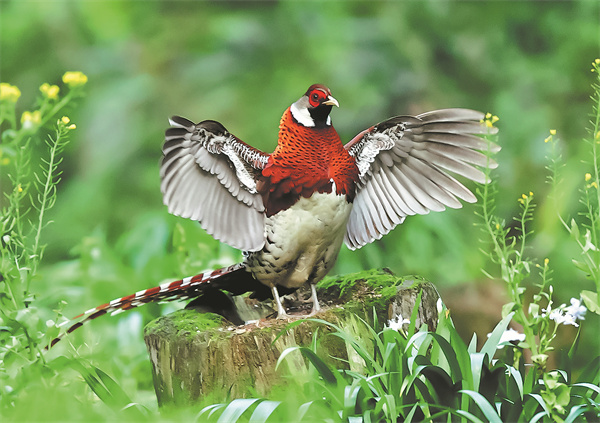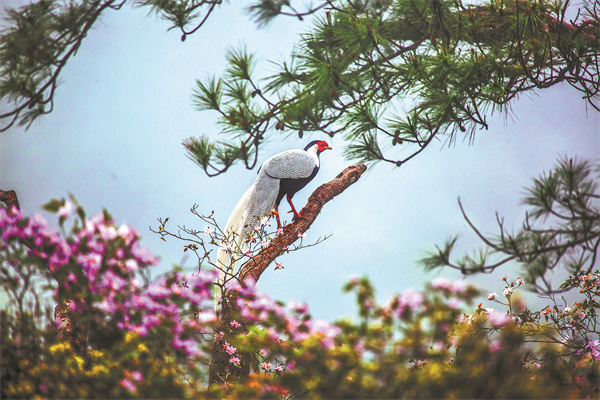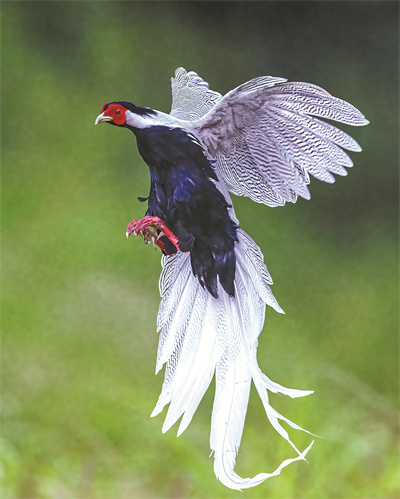
A male Elliot's pheasant flaps its wings while perching on a tree trunk at Fengtian village in Yongan county, Fujian province, in 2020.[Photo provided by Mei Yongcun/Xinhua]
As China's population ages, pensioners are increasingly shaping the country's burgeoning "silver economy" and playing a significant role in driving consumption. This trend is exemplified in a flourishing hamlet nestled amid the rolling mountains of Yongan county in the southeastern province of Fujian.
Fengtian village in Qingshui She ethnic township, Yongan, may not be a household name for many, but for a niche community it stands out as a premier travel destination. With just 180 households and 800 residents, this hidden gem has captured the hearts of elderly bird photographers, a group largely composed of pensioners from major cities across the country.
Referred to affectionately as "silver pheasant village", Fengtian has gained renown among enthusiasts seeking to capture exquisite images of the majestic birds in their natural habitat.
"For those seeking to capture stunning photos of silver pheasants, Fengtian is a must-visit destination," Chen Guangyun, a pensioner from Beijing, told China Daily in the village.
"Here, you can catch a glimpse of these magnificent birds in a variety of picturesque settings, from bamboo forests and clear streams to blooming trees and at sunset."

A male silver pheasant stands on a tree trunk at Fengtian village in 2021.[Photo provided by Yang Enuo/For China Daily]
Developing bird hides
The idea of catering to bird photographers in Fengtian first occurred to Zhu Fusheng, once head of the Tianbaoyan National Nature Reserve in Yongan, which shares a border with the village, as recounted by Xiong Shengchun, one of the village's pioneering bird hide operators.
Xiong, who worked as the village head from 2000 to 2003, knew Zhu, who used to work with the local forestry bureau, for many years. As head of the nature reserve, Zhu sometimes visited the village to watch birds in the forests, spread across 3,300 hectares.
During one such visit, Zhu clicked photographs of Elliot's pheasants, an endangered bird under the State's protection and native to the country's southeastern part. Excited by his discovery, Zhu showed the images to Xiong. "I wasn't particularly thrilled," Xiong said. "After all, I had seen many of these birds while tending to my family's bamboo groves."
So Zhu proposed that Xiong build a bird hide — camouflaged shelters used to observe birds from a close range without disturbing them. The plan was to entice Elliot's pheasants to open areas, offering bird-watchers an opportunity to capture these rare birds in their natural habitat for a fee.
Born in 1959, Xiong had engaged in bamboo trade during the 1990s and opened a pig farm in 2004, so he knew he must seize what looked like a great business opportunity.
In 2015, Xiong began constructing a bird hide, within a serene bamboo grove, on his family's property.
However, even after 4-5 months, no Elliot's pheasants showed up. "I was disappointed and was thinking of giving up. Around that time Zhu visited me and encouraged me to not give up yet," Xiong said.
In the sixth month, the elusive pheasants finally made their appearance, he said. By February or March of 2016, bird photographers began visiting his hide.
Meanwhile, he built a bird hide at another location to feed silver pheasants, which were easier to sight than Elliot's pheasants. By September 2015, silver pheasants, a large and spectacular bird known for its long-tailed males that have white or silver-gray upper parts, were showing up regularly, much to the delight of visiting photographers. In the ensuing years, Xiong expanded his avian sanctuary by setting up four additional bird hides, all dedicated to the enchanting silver pheasants.
Each hide offered a unique backdrop for photography enthusiasts, ranging from a tranquil stream setting to the lush bamboo forest, blooming rapeseed fields, ancient trees, and picturesque pine forests illuminated by the hues of sunset.
The silver pheasants, set against these captivating backdrops, emerged as the primary draw for bird photography enthusiasts. "Instead of young bird-watchers, most of our visitors are senior bird photographers from big cities," Xiong said.
"They enjoy plenty of opportunities to produce excellent bird photos at our bird hides."

A male silver pheasant takes wing.[Photo provided by Mei Yongcun/Xinhua]
Running homestays
In 2016, Xiong transformed his house into a homestay, offering eight rooms to guests. It has undergone several upgrades over the years and today boasts 18 standard rooms that can accommodate up to 30 guests. Xiong charges 100 yuan ($13.76) per day for a room. His homestay receives about 800-1,000 guests a year.
"Because most of my customers are retirees, they usually have time to stay in my place for three days and take photos at five or six bird hides," he said.
Xiong has three brothers living in the village, who either run bird hides or homestays. Whenever his homestay is fully occupied, Xiong Shengchun directs additional visitors to his younger brother Xiong Shengshui's homestay.
Xiong Shengshui, 56, operates three bird hides and has four rooms for bird photographers. Leveraging his wife's culinary expertise, the couple even prepare meals for Xiong Shengchun's guests. "My guests love my sister-in-law's cooking," Xiong Shengchun said. "Many of them walk the 2-3 minute distance from my place to my brother's to eat."
According to Xiong Shengchun, many of his relatives at the village are engaged in the catering business.
Besides his three brothers, his nephew, Xing Zhongyuan, is a major player in the bird-watching industry. The 41-year-old has been a forest ranger at the Tianbaoyan nature reserve since 2010. However, he said, the income from the job was never enough for him to raise his family of six. "In 2010, it was 300 yuan a month and is now just a little more than 1,000 yuan," he said.
In 2017, he started setting up bird hides for visiting bird photographers. He constructed and opened a homestay in 2021, offering 11 standard rooms for his guests.
He now operates four bird hides, one featuring a backdrop of blooming Rhododendron flowers.
"In April, after several species of Rhododendron flowers start blooming, it will become the most sought-after hide in our village," Xing said.
Win-win cooperation
Balancing his duties as a ranger patrolling the reserve, Xing entrusts the management of one bird hide to his father. "The income from the hide can support my father as his pension," Xing said.
The responsibility of taking care of the other three hides goes to his partner, Xiong Qingwen. The income generated from these hides is allocated based on the terms outlined in their contract.
This division of labor allows Xing to focus on his duties as a ranger while sustaining a thriving homestay business.
Xiong Qingwen was working at an industrial park in Yongan, Fujian province, with his wife, earning 7,000 to 8,000 yuan a month. He was persuaded by his then village head to return and convert his house into a homestay for bird photographers, with a 50,000 yuan subsidy from the township government.
Xiong Shengchun emphasizes the demanding and monotonous nature of maintaining a bird hide throughout the year. He describes the task as challenging, requiring daily visits to the hides to ensure the well-being of the birds under their care.
"Even during the period between June and September (characterized by the molting phase of silver pheasants when their plumages are not as visually striking as usual), the responsibility of tending to the hides and caring for the birds remains constant," he said.
The villagers' dedication to the business has clearly paid off. Over the years, Fengtian has attracted bird photographers from over 20 countries and regions, including the United States, the United Kingdom, France, Italy, and Singapore. The place sees at least dozens of visitors daily, generating an annual revenue of more than 5 million yuan, according to a report in a local newspaper.